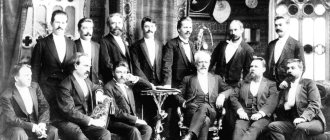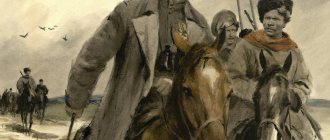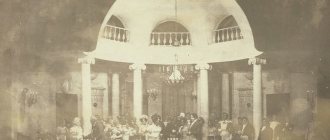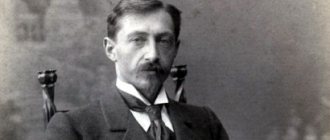Poem “Childhood” by Ivan Surikov
Childhood is an unforgettable time in everyone's life. A person carries childhood impressions throughout his life, returning to them in moments of sadness. This is exactly what I. Z. Surikov’s poem “Childhood” tells about.
The poem “Childhood” by Ivan Zakharovich Surikov was written in 1866. The poet was in a difficult financial situation almost all his life. It is not surprising that he created a work that evokes a painful longing for a carefree childhood.
Artistic media
I. Z. Surikov uses a variety of phonetic, lexical, syntactic and artistic means to create a deeper impact on the reader:
- anaphora (single beginning): the first 3 lines of the initial stanza begin the same;
- homogeneous members: “quietly, // Reluctantly”;
- rhetorical appeal: “You flowed merrily, // Childhood years!”;
- epithets: “dear”, “quietly”, “angrily”;
- antonyms: “I’m in grief in the snowdrift, // And the guys are laughing!”;
- synonyms: “Grief and trouble”;
- colloquial forms of words: “swinging”, “dying”, “rose up”;
- interjections and onomatopoeic words: “grab!”, “clap!”;
- sound writing (alliteration and assonance): in stanza 7 the sound [w] is constantly repeated, and in stanza 8 the sounds [o] and [a];
- lexical repetition: “The winter evening lasts, // Lasts endlessly...”.
Thanks to the means used by the poet, I. Z. Surikov’s poem returns the hero (and the reader) to the time when he was happy. The image of a little man sledding down a mountain and listening to his grandmother's fairy tales is drawn by the poet very clearly and believably.
LiveInternetLiveInternet
Ivan Zakharovich Surikov
This is my village; This is my home; Here I am sledding along a steep mountain; Here the sled rolls up, and I’m on its side - bang! I'm rolling head over heels downhill into a snowdrift.
And my boy friends, standing above me, laugh merrily at my misfortune.
My whole face and hands are covered with snow... I'm in grief in the snowdrift, but the guys are laughing!
But meanwhile, the village of Sunny had long since settled; A blizzard has arisen, the sky is dark.
You'll be completely cold, You won't bend your arms, And you'll quietly wander home, Reluctantly.
Throw the old fur coat off your shoulders; You will climb onto the stove to see your gray-haired grandmother.
And you sit, not a word... Everything around is quiet; Just hear the Blizzard howling outside the window.
In the corner, bent over, the grandfather weaves bast shoes; Mother at the spinning wheel Silently spins flax.
The hut is illuminated by the Light of the Light; The winter evening lasts, Lasts endlessly...
And I’ll start asking my grandmother for fairy tales; And Grandma Tales will begin to tell me:
How Ivan Tsarevich caught the Heat Bird; How the Gray Wolf got him a bride.
I listen to a fairy tale, and my heart dies; And the evil wind sings angrily in the chimney.
I'll snuggle up to the old lady. The speech gurgles quietly, And a sweet dream closes my eyes tightly.
And in my dreams I dream of Wonderful lands. And Ivan Tsarevich - It’s like me.
Here in front of me is a wonderful garden blooming; There is a big tree growing in that garden.
A golden cage hangs on a branch; In this cage the bird is burning like a fire.
Jumping in that cage, Singing merrily; The entire Garden is bathed in a bright, wonderful light.
So I crept up to her and grabbed her by the cage! And I wanted to run away from the garden with the bird.
But it was not there! There was a noise, a ringing; The guards came running into the garden from all sides.
They twisted my hands and lead me... And, trembling with fear, I wake up.
Already into the hut, out the window, the sun is looking; The grandmother stands in front of the icon, praying.
You flowed merrily, Children's years! You were not overshadowed by grief and trouble.
Surikov Ivan Zakharovich (04/06/1841-05/06/1880) - an outstanding poet, self-taught. His work began to be turned into folk songs, and thus he became a prominent representative of the “peasant” trend.
Surikov Ivan Zakharovich was born in the village of Novoselovo, Yaroslavl province, on April 6, 1841. Father Worked in a small shop in Moscow. Surikov and his mother lived in the village, but later moved to his father. The boy helped his father a lot with work and at the same time studied literacy and writing. Ivan devoted a lot of his time to books and reading, thanks to this he began to write poetry early, which unfortunately has not survived to this day.
Surikov’s life in the village left its mark. Rustic motifs are clearly visible in his work.
The most significant event in Ivan’s life was his reading of poetry. Also a number of novels by Merzlyakov, songs by Tsygankov. The boy was taught in the “old-fashioned way”; he sang poems rather than read them. In the future, this served him to test his poems for their duration.
When Surikov reached adolescence, the father decided to put his son behind the counter. The father was completely uninterested in the boy’s passions and hobbies. But Ivan still decided to continue reading books and writing poetry in secret from everyone. But soon all this bore fruit and Surikov wrote his first poem, which was inspired by the fire that happened in their house. Their neighbor Dobrotvorsky, who gave books to Ivan to read, praised him for this verse and gave advice to continue doing it. Inspired by such wishes, the boy soon wrote several plays in the form of songs.
Later in 1857, Surikov already wrote a whole notebook of poems. Although he had barely turned 16. Friends began to advise him to take his poems to two famous poets. From one he received useful advice and even took part. From the second he heard an unfavorable review, which plunged him into despondency. But this only strengthened Ivan’s spirit, he began to work harder. He began to improve smoothness and sonority in his poems. And this led to the fact that simplicity of image and artistry began to appear in his poetry.
In 1860, the poet Pleshcheev helped Surikov; he published his poems in the magazine “Entertainment”. In the same year, his mother dies and his father marries another woman, who does her best to create terrible living conditions in the house and Ivan leaves home. He tries different jobs as a copyist and typographical compositor.
Then the stepmother leaves Ivan’s father and robs him dry, and the son returns home.
In 1871, the first collection of his poems in Surikov’s life was published. A few years later he was elected member of the Society of Lovers of Russian Literature. At the same time, he creates his own circle to help aspiring writers and poets.
Surikov died in Moscow from tuberculosis, in complete poverty. He was buried at the Pyatnitskoye cemetery.
Memories from childhood are wonderful. Because this stage is special, “You are not overshadowed by grief and misfortune,” the author writes, who may disagree with this. Filled with happiness and joy, it is like a ray of light in a person’s memory, where it remains forever.
Ivan Zakharovich Surikov in his poem “Childhood” immerses us in a wonderful world. Filled with a feeling of freedom and joy of life. A favorite winter pastime for children is sledding. Roll down the mountain with the breeze, and laugh heartily when flying into a snowdrift.
Having shaken off the snow, wiping your face and hands that were pinched in the cold, you run up the mountain again, pulling the sled behind you. In moments when you have fallen and everyone is laughing at you, the feeling of self-pity passes quickly. And you are already flying from the mountain again. This is what childhood is all about, enjoying ordinary things. The days in winter are short and the sun sets early. The kids, having had a good time, wander off to the huts, frozen from the cold, but have no desire to go. A completely ordinary Russian village, of which there are many, where smoke from chimneys stretches over the village, huddling together like summer fog. Light appears in the windows, lit torches, brightening up the long, winter evening with its dim light. The house is filled with the smell of tar and soot. The whole family gathers near a large warm stove, there is enough space and warmth for everyone, and a blizzard is raging outside the window. Everyone does their own thing.
Having warmed up after the frost, sitting on the stove, where the grandmother tells fairy tales, her quiet murmuring voice plunges you into a sweet sleep. And in a dream, a fairy tale comes true, because in childhood everything is possible, because you believe in Ivan the Tsarevich with the Gray Wolf, and the Firebird in a golden cage. Now you are turning into a fairy-tale hero, everything is intertwined between reality and dreams. When I wake up, everything continues.
Years later, sometimes you want to go back and just live and laugh. In adult life as a couple, we so lack the ability to easily and simply relate to our problems, disappointments and believe in a fairy tale with a happy ending, and if we fall, get up and quickly run up. Thanks to this work, a nagging feeling of nostalgia arises that can return us to where the warmth of grandmother’s hands is cozy and all together. Let's take it back to childhood more often.
analiz-stihov.ru
Poems of Russian poets. Ivan Zakharovich Surikov “Childhood”
- To introduce students to the work of Ivan Zakharovich Surikov using the example of the poem “Childhood”, to interest them in studying his other works.
- Learn to work with a lyrical work, dividing it into semantic parts, continue to work to identify the main idea of the poetic text.
- Learn to find figurative means of language in the text (personification, epithets, comparisons and repetition techniques) used by the author, continue to work on the expressiveness of reading, learn to highlight logical stresses and pauses with your voice.
- Cultivate a love of reading and cognitive interest.
- Develop memory, logical thinking, speech.
I. Organizational moment.
1. Greeting, check of readiness.
— We have a reading lesson. Do we need to be able to read? For what? What do we learn in this lesson?
II. Updating knowledge.
— What section are we studying? (“Poems of Russian poets.”)
- Do you know what a poem is? (Creation of poetry, creation.)
- What does “create” mean? (Create.)
—Who creates poetry? (Poets.)
— To remember which Russian poets we have already met, I propose to play a little. Now some of you will read by heart passages or poems by poets you already know, and the rest will guess who the author is?
Working with a table.
III. Reporting the topic, setting educational objectives.
- Look, one portrait remains unopened. Why do you think? (Today we will meet another poet and read his poem.)
Today we will discover a new name in the “Poems of Russian Poets” section. This is Ivan Zakharovich Surikov. To guess what this poem is about, let’s look at the key words:
- My village
- my house
- I'm sledding
- boy friends
— What do you think the poem will be about, what topic did the poet touch on? (About children, winter fun.)
- At what age do we embrace winter fun?
The poem by Ivan Zakharovich Surikov is called “Childhood”.
— Why did Surikov touch on this topic in his work? (Childhood is a carefree time.)
Many writers, artists, musicians have repeatedly turned to the theme of childhood in their work, because they considered it the most carefree time. Memories of childhood in adults most often evoke mixed feelings: feelings of joy and regret.
- Why do you think? (Joy - from the events experienced, regret - you can’t return this time.)
IV. Vocabulary work.
- You will be completely cold - you will freeze.
- An old fur coat is an old fur coat.
- The hut is illuminated by a candle stand.
- Light of light.
- The heart just dies - it freezes.
- Sleep closes - close, close your eyes.
- Darkened - darkness (darkness). made them sad, sad.
V. Primary reading.
Primary read does the reading.
— With what feeling does the poet speak about his childhood? (With a feeling of joy and regret.)
VI. Independent reading by students.
— What events that happened to him in childhood does the poet describe?
After reading, the plan is discussed and revealed on the board:
VII. Independent work.
Group assignment: prepare expressive reading, answer questions?
First group: - What does the poet consider his home? —What picture does the author describe? (Skating down the mountain.)
— On whose behalf is the poet telling the story?
(Boy.)
- What's happening to the boy?
— What authorial techniques help the poet convey the swiftness of the action? (Repeat: here. here. here.)
Second group: - What interesting things did you notice in the lexical structure of the text? (Outdated words used.)
- Select and text the words that the poet uses to show the features of that time.
in which does the action take place? (You’ll get cold, old one.)
- Compare “the weather at home” and “the weather outside the window”, what can you say?
Support your answer with words from the text. (Everything is quiet all around / the blizzard howls outside the window.)
- How does the poet talk about the blizzard, what figurative means of language does he use?
(Personification.)
Prove it.
(“Endows” the blizzard with the abilities of a living creature.)
- Give examples of the use of personifications by another author?
(Examples from poems by A.S. Pushkin.)
Third group: -What did the boy dream about? Read it. — What figurative means of language did the poet use in this passage? (Comparisons.)
Give examples
(Tsarevich Ivan as if I were.)
- What words help you find comparisons in the text
(Helping words: as if, exactly.)
Fourth group: - What mood is the boy in during sleep? (Emotions of excitement, fear).
-How does your mood change when morning comes?
(Excitement and fear are replaced by peace.)
- How do you understand the words:
Did you have fun, your childhood years?
— What visual medium does the author use? (Personification.)
—What does the poet compare his childhood years with?
(With water.)
- Why?
(Water sometimes flows very quickly, just like childhood.)
VIII. Checking students' independent work.
- Expressive reading in groups in parts.
- Speech by one person from the group.
IX. Frontal work.
— What was the boy’s childhood like? (Selective reading.)
The boy's childhood was joyful and cheerful.
— Why did Surikov write this poem? (To talk about your childhood.)
- How does the poet appear to us in this poem?
— Would you like to know what the poet’s childhood was really like?
Individual message on the topic: “Surikov’s childhood.”
The poet spent his happy childhood in the village of Novoselovo, Yaroslavl province. His family belonged to the quitrent peasants of Count Sheremetev. His mother and grandmother, who lovingly looked after the boy, left bright memories in his soul and introduced him to the world of folk tales and songs:
And I’ll start asking my grandmother for fairy tales; And my grandmother will start telling me a fairy tale.
The childhood years that “flowed merrily” ended when Ivan turned 8 years old. He went to Moscow to visit his father, the owner of a vegetable shop. Since then, the boy was at the beck and call of first his father, then his uncle, and experienced constant hunger and humiliation. His life was brightened by his acquaintance with two pilgrims, one of whom introduced him to the lives of saints, spiritual poems, and other books of religious content, and the second - to the songwriting of Russian poets.
He himself tried to write poetry, read a lot, drawing inspiration from great poets. He enjoyed Pushkin, Lermontov, Koltsov, Nekrasov, Maykov and others in secret from his father, who angrily lectured the boy: “Extra bookishness will not give a merchant any income. “Without objecting, without entering into arguments, Vanya continued to dutifully drive the hated “trading cart” and until the end of his days he traded in iron and coal, various rags and scrap. But he also had another, secret life: he wrote bright songs and sad poetic stories about the difficult lot of the poor.
Surikov was 21 years old when he met Pleshcheev, to whom he dared to show his poems. Pleshcheev liked the poems, one of the poems was published with his help. Since then, Surikov has been actively publishing in magazines. His poems are set to music and become songs that are still sung and are considered folk: “Rowan”, “Steppe and steppe all around”, a song about the execution of Stepan Razin. The first collection of poems by Surikov (1871) was republished twice within a short time.
The poet died of tuberculosis at the age of forty.
He wrote the warmest poems for children, in which the fairy tale and magic of his childhood come to life, and folklore images form the core of a child’s life:
And Grandma’s fairy tales come to children’s minds: Here is a witch rushing with a broom to the night dances; Here a goblin rushes over the forest with a shaggy head, and across the sky, showering sparks, a winged serpent flies. And some all in white Shadows are walking in the field. Children are afraid - and the children breed Ogonyok.
— Get ready for the end of the lesson.
- What new did you learn? Which Russian poet did you meet?
- What did you study? (Expressive reading and analysis of poetry.)
- Why do we need this? (Read by heart expressively and understand the content of what you read.)
—What is unusual about the poem? (Frequent change of actions, events.)
— How can an artist talk about his childhood? (Draw pictures.)
XI. Homework.
Reading the part you like by heart and illustrating it.




